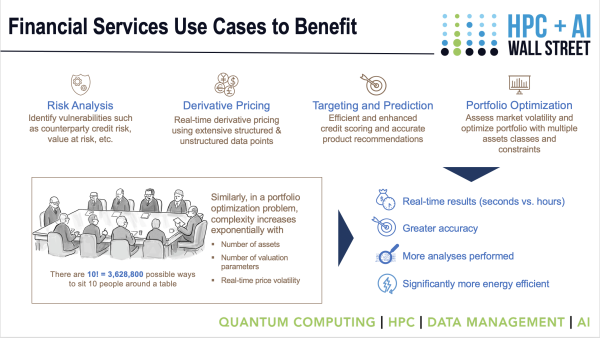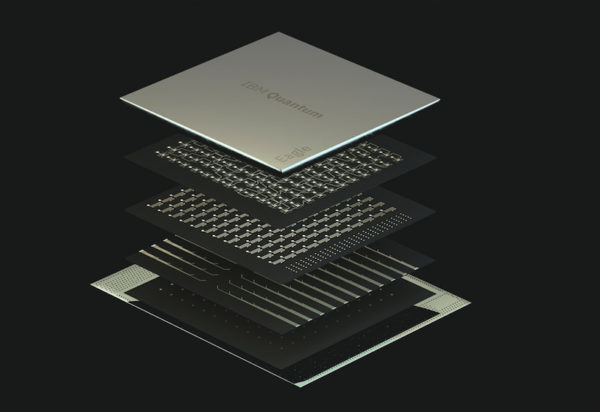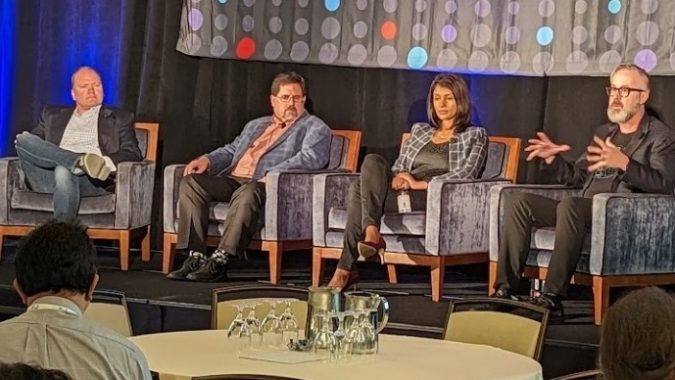What’s the quantum computing fuss all about? Should you jump into the game or run as fast as you can away from it? A fascinating panel with committed quantum players, IBM and Strangeworks, and traditional computing powerhouses, Dell (systems) and AMD (chips), tackled this topic at the HPC + AI on Wall Street conference held earlier this fall.
Ostensibly about quantum computing’s potential in financial services, the panel quickly turned into a broader examination of quantum computing today, expectations for the future, along with a few suggestions for how to build a quantum initiative without breaking the bank. The moderator was Jay Boisseau, HPC & AI technology strategist, Dell. Panelists included: Robert Hormuth, corporate vice president, Architecture & Strategy of the Data Center Solutions Group, AMD; Aparna Prabhakar, IBM, vice president Quantum Partner & Alliances; and William Hurley, founder and CEO, Strangeworks.
The conversation was wide-ranging and covered: quantum computing’s place in the HPC landscape; early quantum successes (think machine learning) early architectures (think GPUs and QPUs); ongoing challenges (think data movement and memory); the reality that quantum computing will be a hybrid classical-quantum creature; and more. One of the more interesting ideas generally agreed upon was that quantum computing must do more than simply speed up tasks we already do – “Quantum should unlock net new workloads. If it doesn’t, then we shouldn’t be in this business. Simple as that,” said IBM’s Prabhakar.
There was even a light-hearted banter around what to call “classical” computing as quantum computing moves forward. (No surprise – quantum vanguarder Hurley likes the term “vintage”!)
What wasn’t in question is the burst of interest in quantum computing.
“At Dell, I’ve noticed that about three years ago, when I talked to our strategic customers maybe one in 10 asked me about quantum computing. About two years ago, it was one-in-five but now it’s certainly more than half; I’m not going to say it’s all yet, but almost all of our most strategic HPC customers,” said Boisseau.

Big supercomputing centers are also catching quantum fever. “The National Energy Research Supercomputing Center (NERSC) did a quick evaluation of their workloads and estimated that half of their workloads could be accelerated greatly by quantum. I said, ‘Well, how did you do that?’ and my friend there said, “Well, frankly, very crudely, and simply, we use the Feynman approach. We said, if the problem is a quantum problem, then a quantum computer can, in theory, be made to solve that problem better. It turns out many of the interesting research problems we have are not at the atomic level anymore but at the quantum level.’” said Boisseau.
Expectations are indeed broadly soaring. JPMorgan Chase has taken the plunge in a big way (see HPCwire article, JPMorgan Chase Bets Big on Quantum Computing). Let’s be clear, no one is arguing quantum computing is ready for prime time today. It isn’t. But there’s a growing consensus it will be ready soon for at least a few narrow applications. Those companies already in the race argue that companies taking a go-slow approach will be left behind.
Hurley said, “If you’re going to take a wait-and-see attitude, you’re probably going to be crushed by some competitive force using quantum computing. I like to think 2023 is like 1963. By 1963, the integrated circuit had kind of come into play, you know, things were kind of taking off. I think 2023 with the number of qubits that companies like IBM have been able to grow over the time – we’ve worked together with them from 17 to 433 qubits – this is the time period where new, not billionaires, but trillionaires will be made.”
Ok then. Before digging into discussion highlights, here are three sets of stage-setting comments from IBM, Strangeworks, and AMD. Not surprisingly, IBM and Strangeworks are all-in on quantum. AMD’s Hormuth is more circumspect:
Is IBM’s Long View Starting to Pay Off?

“In 2016, our CEO came to us and said, hey, when can I see revenue on Quantum? What should we do with this thing called Quantum which is sitting in our research? We sat down and had the conversation about this is going to be an investment…and it was a strategic decision made from a long-term perspective,” recalled Prabhakar.
“I’m betting my career on it, [but] that’s a different story. Today, we have 190 clients in our ecosystem of which a fair number are governments. I’m thinking national labs, but also international. We also have private institutes and around 20 enterprises in our ecosystem, and about 30 to 40 startups. We are very selective about who we let in this ecosystem because the issue is not who wants to work with us, the issue is we have limited resources. From a finance perspective, there’s so much IP, which still has to be created, there’s so many unknowns in that space, that you should be there right now and thinking about it in two senses – one is the business impact, and the other is the technology impact.”
Overall, “We have around 430,000 users, [have run] 1.3 trillion executions, have a fleet of 22 systems, and a whole team focused around making quantum a reality and advancing the quantum computer.”
Strangeworks Says the Quantum Glass is Overflowing

“From 2000 to around 2013 or 2014, there was only about $700 million invested in quantum computing. Then in 2014, and 2015, 15 different companies did 40 equity rounds for a total of a little over a billion bucks. Okay. And that was seen as kind of one of the big inflection points. Last year, $3.2 billion was invested in quantum computing, a billion of it in the last quarter. This year, almost a billion in the first quarter already. We’ll probably surpass that number by an order of magnitude. When we first started Strangeworks in 2018, there was $20 billion in government and everyone invested worldwide. Since then, in less than five years, an additional $10 billion has been pumped into it,” said Hurley.
“So, is [quantum computing] getting the air it needs to grow and the water and all that stuff? It definitely is. The thing I would say to think about is not just the finance going into pushing the technology, and how you can use it as a financial technology, but think about completely new uses. This is unexplored territory. You know, pessimists thought it’s 20 years out when I started; now pessimists think it’s five to 10 years out. Optimists thought it was five years out, now think it’s a year or two. We have customers paying us to use quantum computers to do real world work, right now, today. They are very conservative customers in pharmaceutical and in government, and they’re not people who willy-nilly are throwing money around,” said Hurley.
AMD – Classical Computing is Hardly Done.

“I’m going to add a little bit of a counter view. Moore’s law is not dead. We’re finding ways to push transistor density. We’re finding ways to be more energy efficient. We’re tackling more advanced packaging, wafer level packaging. So, traditional computers have a way to go. I do agree that quantum will coexist in HPC; it’s just another accelerator,” said Hormuth.
On investment, Hormuth said, “You know, big investment does not always mean success. There are plenty of examples in the industry where there was another non x86 64-bit architecture that invested billions and billions and billions, and ended up not being able to succeed. You know the industry has probably poured in, I don’t know, $20 billion into different kinds of persistent memory, phase change memory, things of that nature. That looked pretty good on paper, and some of it worked pretty well, and the last guy standing in that field kind of just shut that down recently.
“I would caution us that a billion dollars here and there does not mean success when there are big commercial companies that invested $20-$30 billion into product lines that couldn’t make them commercial. When we mean commercially viable, it’s got to be at a scale. Building one or two or 100 or 1,000 machines is great. But we’ve got to think bigger if it’s going to be commercially viable and successful, it’s got to be at a scale to the masses. If it’s just in a couple of ivory towers, and academia or governments, and all the government’s care about is cracking RSA. Is that a commercial viable success? I don’t know.”
Strangeworks, founded in 2018, may be the least well-known of the panel companies, at least outside the quantum industry where it is well-known. The company develops software tools for quantum resources, has built a quantum community for education and idea exchange, and works with a host of quantum hardware companies providing access to their resources. Among the panelists, Hurley was perhaps the most unambiguous advocate.
“When we started, I used to joke with our investors, ‘What does Strangeworks do? We write software for computers that don’t exist.’ Then a couple years later it was, ‘We write software for you know, they’re not really computers but are kind of good lab equipment for exploring the quantum landscape.’ Now, almost five years in I can’t say that anymore. Are they the most amazing general purpose quantum computers in the world? Absolutely not. Are they light years over where they were last year and the year before that? Absolutely,” said Hurley.
The full conversation is best watched directly. Here’s a link to the session video. Presented below are a few topics highlighted by the panel.
What Does Early FS Success Look Like?
Besides simply getting quantum computers to work, there are many questions about what financial applications will be able to actually do better on quantum systems than classical resources. Optimization is often touted, but perhaps wrongly so, said IBM’s Prabhakar.
“There are basically three areas which are interesting: there’s simulating nature, there is optimization, and then there is machine learning,” said Prabhakar. “Initially, when we started working with banks, right – JPMC is a client of ours as is Goldman Sachs and others – they started looking at optimization. But it was very clear that there are classical methods which are actually advancing as quickly in optimization. So, if you’d asked me three years ago, my answer would have been optimization. Now we are realizing it’s not optimization, it’s probably machine learning-based analysis, which are going to have first early use cases.
“If you look at the work our clients are doing, you will see that a lot of them are actually not making the decision right now on which of these three areas they want to work on. They’re doing proof of concepts, but they’ve made the most advances in credit analysis, risk analysis, using machine learning, and quantum machine learning specifically. They have small teams which are looking still at optimization and figuring out how do they take their workflows, break it into classical and quantum parts, and stitch them together? There’s a lot of work how do you integrate these,” she said.
Hurley tended to agree, “In December, John Preskill (Caltech) and his team released a paper showing that you could do exponential speedups on machine learning, right. So, they used 40 superconducting qubits. They ran about 1,300 experiments, and they definitively proved there is a quantum advantage to be gained with machine learning. Clearly, machine learning is very important. That would be the first one that would be the most impactful [in FS], because I have not talked to a finance company that is not applying machine learning to all manner of things from risk management, to portfolio optimization, etc. There’s a speedup that is demonstrable right there.”

Quantum’s Place in the HPC Landscape
In one sense, all quantum computing is hybrid – classical computers are required to process the input to and results from quantum computers. But beyond that, most observers think most quantum computing will be hybrid and involve partitioning programs into pieces that are solved on the appropriate quantum or classical resource before being incorporated into a final result. In today’s NISQ (near-term intermediate scale noisy quantum) computer era, the hybrid architecture typically centers on GPUs and QPUs. Quantum simply becomes part of the HPC world.
This shouldn’t seem strange, noted Boisseau, “HPC means just that: literally high performance computing. So, quantum will be a branch of high performance computing. Many people equate HPC with clusters. But you know, Bob Sorenson (Hyperion Research analyst) got up here [at the conference] and talked about using HPC in 1981. I was [doing the same] shortly thereafter, and those were parallel vector machines and then there were MPPs, like the Connection Machine and IBM Blue Gene. Then we saw cluster computing starting in 1994, with Thomas Sterling and Don Becker. To me, as an HPC person, I see this as a natural extension, an evolution of technologies in HPC. I consider this just a new branch of HPC.”
True enough, but given quantum computing’s early stage, it is easy to be confused about what hybrid means.

“You have to be careful with the word hybrid because some of the hardware manufacturers are taking classical and quantum processors and bump-bonding them into hybrids so it’s all one thing. Others are using classical infrastructure, working with GPUs from companies like AMD and Nvidia next to the quantum machine. You have to be very cautious because there’s latency issues with each one of those,” said Hurley.
What does it look like now? “We have several customers who use GPUs, and even analog compute in a chain with quantum computing. They have something they’re doing only the quantum processor can do, and they’re taking those results and sending them back out to other resources. Usually what that looks like is classical GPUs and quantum QPUs,” said Hurley.
“I think defining ‘hybrid’ is a really important part of the conversation,” he added. “Are you talking about hybrid at the actual chip level, are you talking about hybrid in the infrastructure level, are you talking about hybrid being a quantum-inspired algorithm [and] there’s no quantum computer in the chain at all, it’s just running on classical system, but you couldn’t have come to that algorithm without a quantum [predecessor]?”
Prabhakar noted, “First, quantum can’t store your data. Let’s be very clear about that. In some ways, what you’re really doing is sending a query and getting back an answer. It’s like – I don’t know how many of you are Hitchhiker’s Guide to the Galaxy fans – what is the answer to the universe? It’s 42. Right. You get one answer back. Our enterprise clients are actually using their GPU clusters on-prem [with IBM-hosted QPUs on its network]. Latency is today not an issue, because this is the discovery phase and they’re building proof of concepts. The second thing to draw clarity to is that quantum is not production-ready right now. What people are really doing is building the first use cases, actually experimenting and doing things.”
“What we are doing however, with these enterprises and clients, is actually looking at something that we’re calling the orchestration layer. It’s very similar to what you do with HPC. But you’re orchestrating your workloads with your HPC workloads and figuring out how all of them work together. That’s an active area of work, which we are doing, and that’s what I think of as hybrid environments. Right now, we’re not as much thinking about latency because those problems don’t exist honestly. If you can get your compute done, instead of days, in five seconds, do you really care about latency at that point? Not as yet,” said Prabhakar.
She noted further, “We are bringing forward the concept of quantum serverless. Now that HPC is thinking about serverless concepts and how to introduce that [broadly] I think quantum intersects really nicely with that. We are looking at how do you do that and working with our HPC counterparts in national labs to think about what does quantum serverless actually mean? When you think about CPU, you think about GPU? How do you think about QPU, your quantum processing unit in that paradigm?”
AMD, said Hormuth, is a quantum fan to the extent it “generally has a lot of HPC compute.” They go hand-in-hand and AMD could be a component supplier. “From an AMD perspective, we’ve been a leader in chiplet-based technology, and if there is a quantum chiplet that comes along that makes sense to integrate into a traditional classical computer, we’re, we’re well along that journey.”
Boisseau said, “Even Dell, a company that is a traditional classical computing company has absolutely embraced the need for moving into quantum. The Dell research guys have worked with IBM, they’ve worked with IonQ. We recognize that we’re not the ones that make native quantum computing hardware, just as we don’t make the processors that Robert’s company (AMD) makes. But we make solutions for customers and we recognize that those future solutions are going to involve quantum in some way.”
To Get Started, Find a Champion
A key question for would-be quantum users is how to get started. Both Prabhakar and Hurley had advice.
“From our experience with our quantum network, and usually at enterprise, the way it starts, is you actually have a champion,” Prabhakar. “Next, there’s a lot of resources out there, which are free and accessible, where you can get started with your teams right now. The number one thing to do is to have the champion – most of these enterprises who are working with us started with a champion who started with free resources and started engaging with other providers, be it IBM or anybody else.
“Figure out what is hype, because there’s a lot of hype around quantum and you can get on the wrong track very quickly. So, understand how you net that out. And there are short term benefits to quantum let’s be clear. There’s patents to be had. There’s IP to be made. There’s discovery. We (IBM) are in the optimistic group and [think] in the next one or two years, you should see the first use-cases emerge.”
Hurley’s advice was similar. Leverage free resources to start. “On that note, we recently released with the World Bank and Linux Foundation a free quantum training course that you can get from the Linux Foundation. If you want to start with those educational materials, it’s a free course and you can learn about how it [quantum computing] works, the physics level, the programming, the computers, and different architectures.”
He pointed out many quantum tech suppliers have tools they offer. IBM, for example, has Qiskit (quantum SDK), which is open source, free, and has simulators. The point, said Hurley, is “you don’t need to go find a million-dollar budget to get started, even with a company as big as IBM.”
Link to conference session video, https://www.hpcaiwallstreet.com/conference/quantum-is-coming/




























































